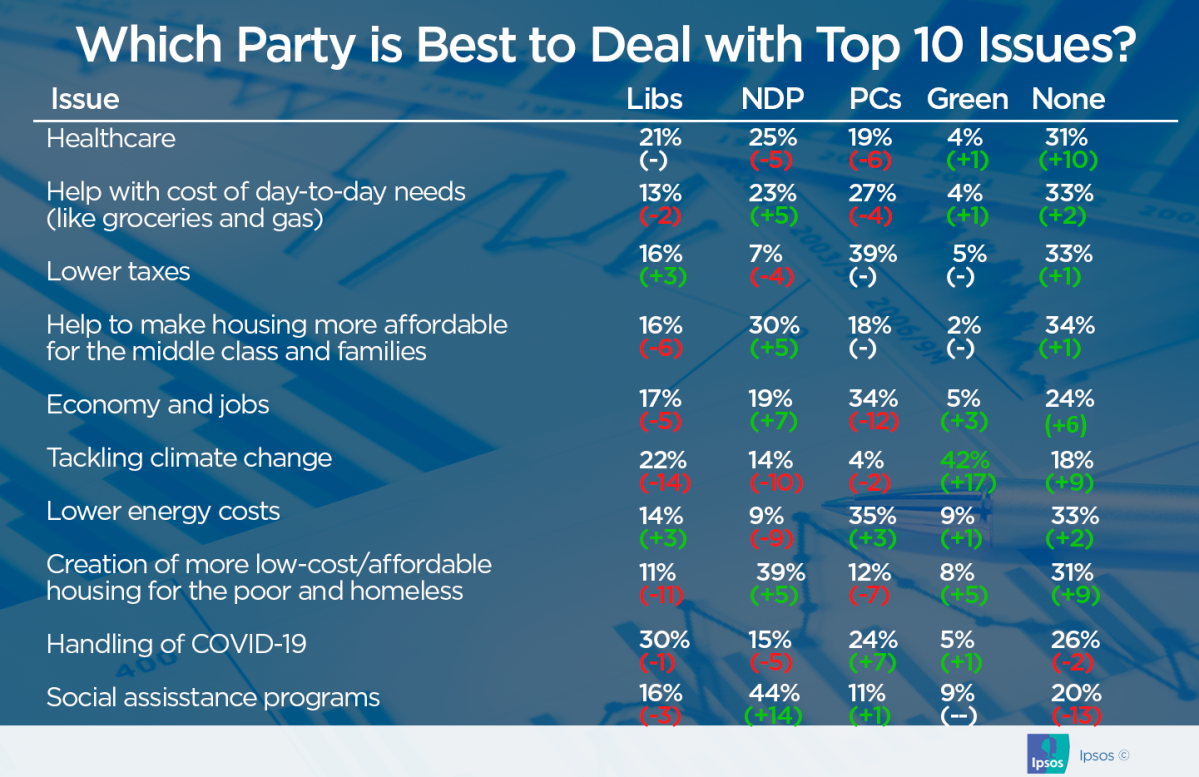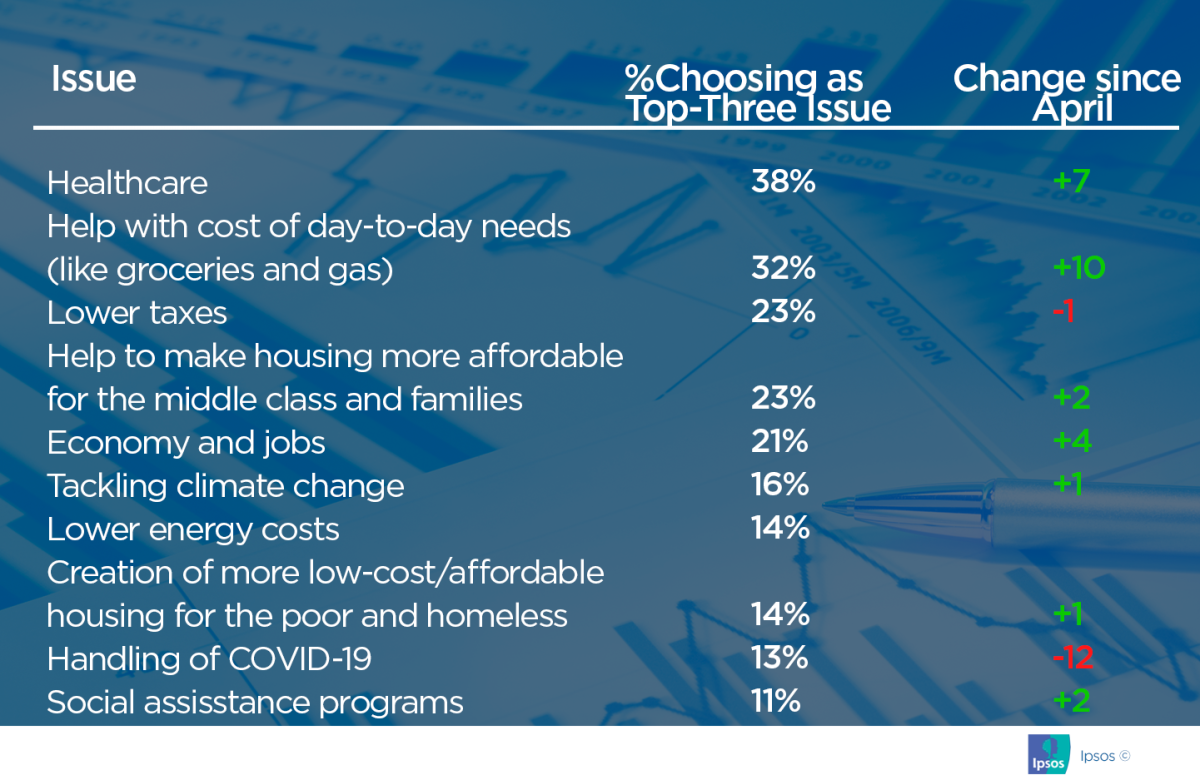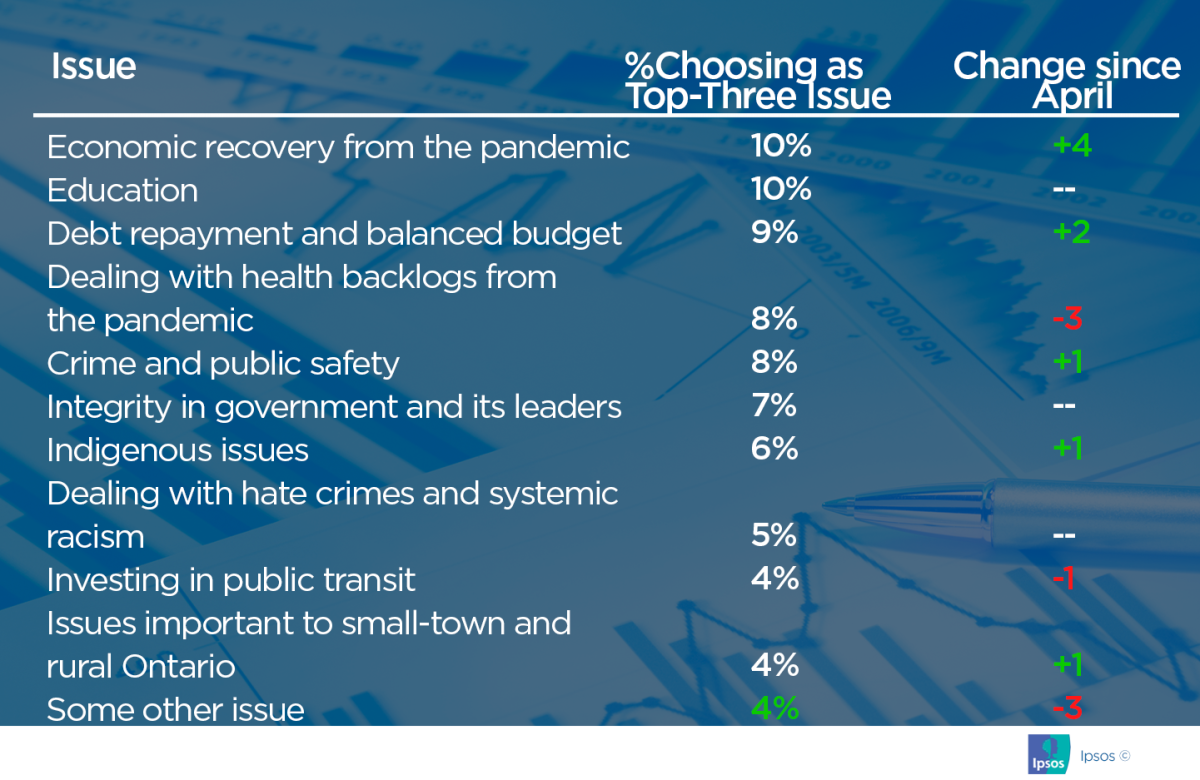The handling of COVID-19 has taken a back seat with more voters saying affordability and health care are top of mind ahead of election day, according to a new Ipsos poll conducted for Global News.

The poll indicates that health care is the most important issue in voters’ minds while affordability issues are driving voter choice.
“What we’re seeing in the polling is that while the NDP leads pretty nicely on the issue of health care, even though it’s the most important issue it’s not the one that’s driving voting in this election campaign,” Ipsos CEO Darrell Bricker said.
“What we’re seeing is that the economic basket of issues, particularly related to affordability, are the ones that are really popping with voters right now. And that’s where Premier Ford does particularly well. And even if he’s not leading on a particular affordability issue, he’s at least competitive. So if (the) election is about the economy, it tends to benefit the Progressive Conservatives.”
The polling showed that 38 per cent of Ontarians say health care is the most important issue determining their choice, which is up by seven per cent since last month.

That’s followed by 32 per cent who indicated that help with the cost of day-to-day necessities is most important (up by 10 per cent), 23 per cent who said helping to make housing more affordable for the middle class is most important (up by two per cent); 21 per cent said the economy and jobs (up by four per cent), and 10 per cent said economic recovery from the pandemic (up by four per cent).
The handling of COVID-19, meanwhile, is the most important issue for 13 per cent of voters, which is down by 12 per cent. Dealing with health backlogs from the pandemic is most important for eight per cent, which is a drop of three points over the last month.
“What we’re seeing with COVID is that it’s really declining as an issue. And the reason for that is people are basically getting used to living with it. They’re tired out,” Bricker said.
“They really can’t go along any farther and the sense of fear, sheer fear that they had a couple of years ago when we started into this pandemic doesn’t exist to the same extent. That doesn’t mean that they’re not concerned about it. But in terms of the priorities in this election campaign, it’s not that big a priority.”

Get breaking National news
Ipsos said affordability is the key issue of the campaign, with 71 per cent of voters agreeing that they will vote for the party that has the best plan to help make life more affordable for the middle class.
More than half of Ontarians — 54 per cent — believe it’s hard for someone like them to get ahead.
The poll also indicated that only 50 per cent of Ontarians believe the party leaders are talking about the issues that are most important to them, seemingly feeding into cynicism reflected in an increase in voter belief that none of the parties are best suited to deal with various issues.
Among the top 10 issues of the campaign, the PCs have lost some ground on affordability issues, but they still lead the other parties on helping with the cost of day-to-day needs, lower taxes, the economy, jobs, and lower energy costs.
The NDP leads on health care, helping to make housing more affordable, the creation of affordable housing, and social assistance.
The Liberals, meanwhile, lead on one issue: the handling of COVID-19.
The Greens also lead on one issue, which is tackling climate change.
“Unless something really unexpected happens — and this is an unexpected thing that the opposition parties won’t cause, but something that the progressive conservatives will do to themselves — unless something like that really emerges, and it’s shocking and it basically wakes people up or forces them out of their torpor, no, I don’t think that there’s anything here that would be particularly encouraging for the opposition parties,” Bricker said.
“This is really a campaign for voters when it comes to issues about pocketbook issues, mostly about affordability. And on that set of issues, the Progressive Conservatives are particularly well positioned. The usual progressive agenda is not really popping at the moment for voters.”
Bricker said that if the NDP position themselves as the best party to deal with health care as opposed to the Liberals, they may have a stronger position, but it won’t be enough to chip away at the PCs.
“If they can push through that message and present themselves as the real alternative on that question, it gives them, as the incumbent official opposition, a stronger position. But apart from that, (there isn’t) really something that’s going to drag down the Progressive Conservatives at this stage,” he said.
Methodology: These are some of the findings of an Ipsos poll conducted between May 17 and 19, 2022, on behalf of Global News. For this survey, a sample of n = 1501 Ontarians aged 18+ was interviewed online (n = 1001 though the Ipsos I-Say panel and non panel sources) and by live-operator telephone interview (n = 500 through landline and cellphones). Online respondents earn a nominal incentive for their participation. Quotas and weighting were employed to balance demographics to ensure that the sample’s composition reflects that of the adult population according to Census data and to provide results intended to approximate the sample universe. The precision of Ipsos polls which include non-probability sampling is measured using a credibility interval. In this case, the poll is accurate to within ± 2.9 percentage points, 19 times out of 20, had all Ontarians been polled. The credibility interval will be wider among subsets of the population. All sample surveys and polls may be subject to other sources of error, including, but not limited to coverage error, and measurement error.











Comments